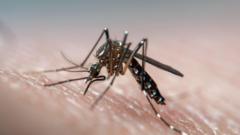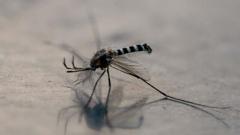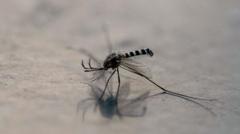In an innovative approach to combat diseases spread by mosquitoes, scientists have found that making male mosquitoes genetically deaf could significantly hinder their reproduction capabilities. This research, conducted by a team at the University of California, Irvine, targets the pesky Aedes aegypti mosquitoes responsible for transmitting illnesses like dengue, Zika, and yellow fever to approximately 400 million people annually.
The mating rituals of these mosquitoes take place mid-air, where males utterly depend on their ability to hear the attractive wingbeats of females to pursue them. By altering a specific genetic pathway linked to hearing, researchers created male mosquitoes that exhibited no physical interactions with females, even after spending three days together in a cage. This unique modification involved targeting a protein known as trpVa, essential for auditory function.
The experiment yielded striking results; while wild, non-mutated male mosquitoes quickly engaged in mating, resulting in nearly complete fertilization of female partners, the genetically modified deaf males did not engage in any mating behavior. Their total inability to detect the sounds of potential mates rendered them helpless in the pursuit of reproduction, as confirmed by findings published in the journal PNAS.
Dr. Joerg Albert, an expert on mosquito mating from the University of Oldenburg in Germany, praised the research, noting that targeting the sense of sound could present a promising avenue for mosquito control. He highlighted the study's unique contributions, providing evidence of the essential role hearing plays in mosquito mating. Albert warned, however, that while reducing the population of mosquitoes is beneficial for controlling disease spread, employing such techniques must be studied carefully; without the males’ ability to hear and "acoustically chase," female mosquitoes might face extinction.
In addition to this revolutionary approach, alternative methods are also being explored, such as the strategic release of sterile males in outbreak-prone regions. While mosquitoes may pose health risks, they also serve critical roles in the ecosystem as food for various wildlife and as pollinators, thus emphasizing the need for balanced control strategies.










